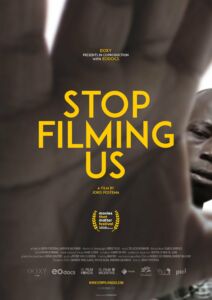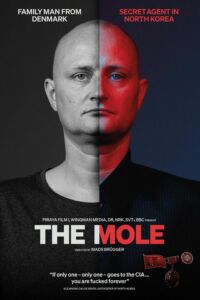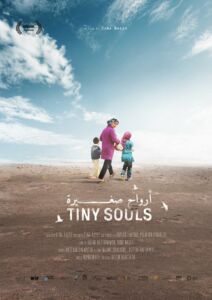Trailer: Stop Filming Us [Youtube]
 A growing group of young adults in Goma in the Democratic Republic of Congo are resisting the one-sided reporting about their city; reporting that only shows stereotypical images of war, violence, illness and poverty, which is the result of years of Western domination. Such images do not reflect the reality in which they live in.
A growing group of young adults in Goma in the Democratic Republic of Congo are resisting the one-sided reporting about their city; reporting that only shows stereotypical images of war, violence, illness and poverty, which is the result of years of Western domination. Such images do not reflect the reality in which they live in.
In STOP FILMING US, filmmaker Joris Postema shows the struggle that journalist Ley Uwera, photographer Mugabo Baritegera and filmmaker Bernadette Vivuya deal with when trying to capture and show their own experience of life in Goma. There are 250 Western NGOs in Goma and the image of a non-functioning government and a helpless population fits into this NGO-dominated economy. Mugabo tries to show the beauty of life in Goma and Bernadette tries to do everything possible to finance a film about her vision of Goma’s colonial past. Ley also works for Western NGOs and because of this she regularly finds herself in an ideological battle: either work for a well-paid Western reporting organization or work unpaid as a freelance reporter but be able to have her own opinions. What are their perspectives and how do they feel about the dark sides of Goma?
The question arises whether a Western filmmaker is able to capture anything of truth about this complex, damaged and beautiful country. Is this even possible after the way the Western imagery has been used? Is the filmmaker part of the ‘white savior complex’ and just wants to clear his conscience? Do Western ‘good intentions’ only cause destruction and frustration? With the open confrontations that the filmmaker enters into with the characters and the local crew, he tries to bring the mutual (subconscious) assumptions to the surface; the prejudices provide a deeper insight into the inequality of power that lies under the mechanism of Western imaging.
Marwa and her younger sister Ayah and brother Mahmoud live in the Zaatari refugee camp in Jordan. They fled from Syria with their mother and older brothers and sisters. When filmmaker Dina Naser starts documenting them in 2012, their respective ages are 11, 9 and 5.
The children speak openly with Naser about the horrors they experienced in Syria, but they remain resilient and cheerful. The setting is a huge camp cut off from the outside world by barbed wire. Here they live in primitive conditions, in a small space lacking running water or other basic necessities. Despite the hardships, this is where the children explore and play.
As the years pass, Naser sometimes loses contact with the family despite her best efforts. But the children continue to film each other with a camera she gave them. An abrupt turn of events at the end of the film reminds us of how precarious life is for this family fleeing war.
https://www.idfa.nl/en/film/2f04919d-be57-4807-81ff-6899019c7aa6/tiny-souls
Trailer: The Mole [Youtube]
 Director Mads Brügger; Producers Bjarte Mørner Tveit, Peter Engel; Produced by Piraya Film, Wingman Media, co-produced with BBC, DR, SVT & NRK, 2020
Director Mads Brügger; Producers Bjarte Mørner Tveit, Peter Engel; Produced by Piraya Film, Wingman Media, co-produced with BBC, DR, SVT & NRK, 2020
When Ulrich Larsen aka The Mole enters the international North Korean Friendship Association (KFA), he quickly jumps the organization’s rank and becomes friendly with KFA’s almighty President Alejandro Cao de Benós.
When Cao de Benós tells The Mole that he is looking for possible investors into North Korea, The Mole introduces the mysterious “Mr. James” (played by Jim Latrache-Qvortrup), who pretends to be a possible investor. Cao de Benós gets all excited about Mr. James and the possibility of selling drugs and weapons from North Korea, so he arranges for The Mole and Mr. James to travel to North Korea. In North Korea, officials from the regime offer Mr. James to sign a contract on producing drugs and weapons. Later, Mr. James meets the North Koreans again in Uganda, where they discuss buying an island in Lake Victoria to construct an underground drug- and weapons manufactory under the disguise of establishing a luxury hotel.
Filmed in secrecy over a period of 10 years, THE MOLE is the most disturbing story of the 21st century and will make you wonder if the world will ever be the same again.
